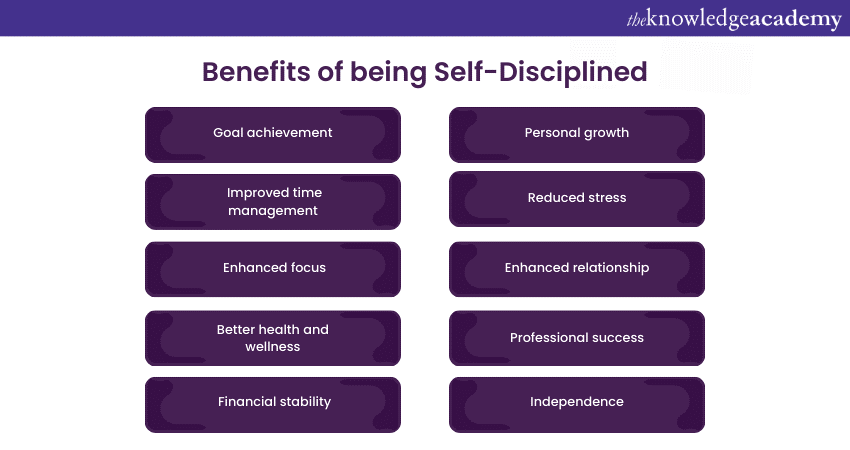We may not have the course you’re looking for. If you enquire or give us a call on 800600725 and speak to our training experts, we may still be able to help with your training requirements.
Training Outcomes Within Your Budget!
We ensure quality, budget-alignment, and timely delivery by our expert instructors.

In a world full of distractions and continuous temptations, Building Self-Discipline has become vital for achieving professional and personal growth. It is the ability to have control over one’s emotions, impulses, and actions aiming to achieve long-term goals. It is the foundation of self-mastery and a primary trait of high performers in various fields.
However, developing a Self-Discipline is not a cakewalk. It needs continuous hard work and dedication. But if you are determined, you can master this art. Want to know how? Look no further. Read this blog to learn about Self-Discipline. Also, explore its benefits and how to master this art in this world full of distractions.
Table of contents
1) What Is Self-Discipline?
2) Benefits of being Self-Disciplined
3) Steps to develop Self-Discipline
a) Clarify your goals
b) Recognise and eliminate temptations
c) Seek an accountability partner
d) Note down your goals
e) Make a to-do lists
f) Streamline your task lists
g) Construct an action plan
4) Conclusion
What Is Self-Discipline?
Self-Discipline is a fundamental aspect of human behaviour and personal development that entails the ability to control one's impulses, emotions, and actions in pursuit of long-term goals and objectives. It is essentially the practice of making conscious choices and consistently adhering to them, even when faced with distractions, temptations, or adverse circumstances.
Self-Discipline requires an individual to exercise restraint and stay committed to their intended course of action, regardless of the immediate satisfaction that might come from deviating from it. This capacity to delay short-term satisfactions for the sake of achieving more significant, often future-oriented, goals is a hallmark of Self-Discipline.
Moreover, it is a skill that plays a vital role in personal and professional success, as it allows individuals to overcome procrastination, maintain focus, and effectively manage their time and resources. Thus, Self-Discipline is about taking charge of one's choices and behaviours to make progress towards desired outcomes, even in the face of challenges and distractions.

Benefits of being Self-Disciplined
There are various benefits of Self-Discipline that extend across various aspects of an individual's life. The following are some of those benefits:

1) Goal achievement: Self-Discipline is a driving force behind achieving personal and professional goals. It helps individuals stay committed to their objectives. Thus, they can make consistent progress and ultimately reach their desired outcomes.
2) Improved time management: Self-Disciplined individuals tend to use their time more efficiently. They can prioritise tasks, set schedules, and adhere to them, resulting in better time management and increased productivity.
3) Enhanced focus: Self-Discipline allows people to maintain focus on their tasks and responsibilities, avoiding distractions and procrastination. This heightened concentration can lead to higher quality work and faster task completion.
4) Better health and wellness: Self-Discipline can be applied to maintain a healthy lifestyle. It helps people adhere to exercise routines, dietary plans, and good habits, leading to improved physical and mental well-being.
5) Financial stability: Practicing Self-Discipline in financial matters involves budgeting. It can save and avoid impulsive spending. This can contribute to greater financial stability and security over time.
6) Personal growth: Self-Discipline fosters personal growth and development. It encourages individuals to continuously learn, acquire new skills, and strive for self-improvement.
7) Reduced stress: With effective Self-Discipline, people can manage their responsibilities and commitments more efficiently, leading to reduced stress and anxiety. They are better equipped to handle challenging situations.
8) Enhanced relationships: Self-Disciplined individuals often exhibit more patience, understanding, and control over their emotions. This can improve their interactions with others and strengthen relationships.
9) Professional success: Self-Discipline is a critical trait in the workplace. It leads to greater reliability, consistent performance, and the ability to meet deadlines, all contributing to career advancement.
10) Independence: Self-Discipline empowers individuals to rely on themselves to achieve their goals and objectives. It reduces dependence on external factors and can lead to greater self-reliance.
Fuel your success today – register for our Motivation and Goal Setting Training now!
Steps to develop Self-Discipline
Nurturing Self-Discipline is a deliberate process that involves several key steps. Let's explore each step in more detail.
Clarify your goals
Clarifying your goals is a pivotal step in the journey of Building Self-Discipline and personal development. It involves the following:
a) Process of defining your ambitions in clear and specific terms.
b) Articulating precisely what you want to achieve.
c) Setting measurable targets.
d) Ensuring that your goals are realistic.
e) Attaching deadlines to your goals.
f) Writing them down for reference.
The act of clarifying your goals transforms vague aspirations into tangible objectives, providing you with a roadmap to guide your actions and measure your progress. Moreover, regularly reviewing and adjusting your goals ensures that they stay relevant and attainable as life circumstances change. This step serves as a foundation for Self-Discipline, and it offers a clear sense of purpose and direction as you work towards your desired outcomes.
Recognise and eliminate temptations
Recognising and eliminating temptations is a critical aspect of Self-Discipline. It involves the conscious awareness of elements in your environment or within yourself that may divert your focus or hinder your progress. Recognising temptations means acknowledging these distractions, whether they are related to procrastination, unhealthy habits, or any other form of instant gratification that could deter you from your objectives. Once identified, the next step is to take proactive measures to eliminate or minimise these temptations. This might involve the following:
a) Creating a workspace that is free from distractions.
b) Developing strategies to manage cravings
c) Finding healthier alternative activities to replace detrimental ones
By recognising and combating temptations, you strengthen your Self-Discipline. This way, you can stay committed to your goals and maintain your progress.
Seek an accountable partner
Seeking an accountable partner is a valuable strategy for enhancing Self-Discipline and achieving personal and professional goals. This involves finding someone, such as a friend, family member, colleague, or mentor, who is willing to support and monitor your progress toward your objectives.
An accountable partner is someone with whom you can share your goals, who provides encouragement and guidance, and who regularly checks in on your progress. Knowing that someone is holding you accountable can boost your motivation and commitment. It is because you're less likely to veer off course when you have the added responsibility of reporting your progress to another person. This external support system can help keep you on track, ensure consistency in your efforts, and increase your chances of successfully reaching your goals.
Unlock your emotional intelligence with our Emotional Intelligence Course today and transform your life!
Note down your goals
Noting down your goals is fundamental in developing Self-Discipline and goal attainment. This step involves the act of recording your objectives in a tangible form, such as writing them in a journal, creating a digital document, or making a vision board. By putting your goals in writing, you make them more concrete and real, enhancing your commitment to achieving them.
This written record serves as a constant reminder, helping you stay focused and accountable for your aspirations. Regularly revisiting your written goals provides a sense of direction and purpose, and it allows you to track your progress, make necessary adjustments, and celebrate your accomplishments. Thus, the act of noting down your goals is a simple yet powerful technique. It solidifies your commitment and aids in staying on course toward personal and professional success.
Make a to-do lists
Making a to-do list is a practical and effective tool for managing tasks and fostering Self-Discipline. It involves the process of creating a list of specific activities, responsibilities, or goals that need to be accomplished within a defined period.
To-do lists break down larger, often overwhelming objectives into smaller, manageable tasks. By organising these tasks in a list, you gain clarity on what needs to be done, which prevents feelings of being overwhelmed and increases your focus.
The act of crossing off completed items provides a sense of accomplishment and motivation. To-do lists not only keep you on track but also help prioritise activities. This ensures that you allocate your time and energy to the most crucial tasks. This simple practice enhances productivity, accountability, and Self-Discipline by providing a clear and structured path to follow in your daily life.
Streamline your task lists
Streamlining your task lists is an important step in optimising your productivity and maintaining Self-Discipline. It involves the process of refining and prioritising the items on your to-do lists to make them more manageable and effective.
When you streamline your task list, you focus on the most important and high-impact activities while eliminating or postponing less critical tasks. This process prevents you from overloading your list with too many items, which can lead to feeling overwhelmed or spreading your attention too thin.
By honing the essential tasks, you increase your ability to accomplish your top priorities and maintain your Self-Discipline. This step encourages better time management, concentration, and the efficient allocation of your resources. This ensures that your efforts are directed toward your most significant goals and objectives.
Construct an action plan
Constructing an action plan is a pivotal step in achieving Self-Discipline and realising your goals. This process involves creating a detailed roadmap that outlines the specific steps, tasks, and milestones necessary to reach your objectives. An action plan breaks down your goals into actionable and manageable components, complete with deadlines and resource requirements. It serves as a strategic guide that provides clarity on what needs to be done, in what order, and by when.
By constructing an action plan, you enhance your ability to stay on track and organised. Thus, you minimise the chances of becoming overwhelmed or losing focus. This structured approach not only promotes Self-Discipline but also empowers you to monitor and measure your progress, make necessary adjustments, and stay committed to the path that leads to the successful achievement of your aspirations.
Join our Active Listening Skills Course now and unlock the power of effective communication!
Conclusion
Self-Discipline is a fundamental trait that can significantly impact personal and professional success. It involves a deliberate and consistent effort to control impulses, stay committed to goals, and effectively manage one's time and resources. To develop this skill, it's essential to clarify your goals, recognise and eliminate temptations, seek an accountability partner, note down your goals, create to-do lists, streamline those lists, and construct an action plan.
Transform your life with our Personal Development Training. Take the first step toward a better you – register today!
Frequently Asked Questions
Upcoming Career Growth Batches & Dates
Date
 Motivation and Goal Setting Training
Motivation and Goal Setting Training
Fri 27th Dec 2024
Fri 28th Feb 2025
Fri 4th Apr 2025
Fri 27th Jun 2025
Fri 29th Aug 2025
Fri 24th Oct 2025
Fri 5th Dec 2025







 Top Rated Course
Top Rated Course


 If you wish to make any changes to your course, please
If you wish to make any changes to your course, please


